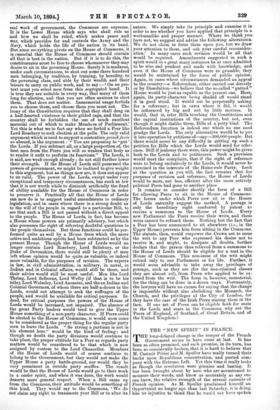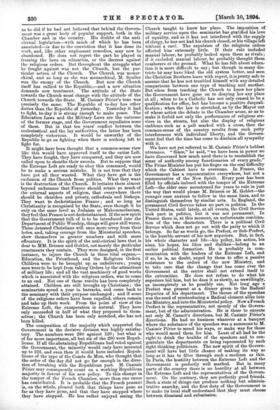THE "NEW SPIRIT" IN FRANCE. T HE long-delayed change in the
temper of the French Government seems to have come at last. It has been so often promised, and each promise, in its turn, has been so consistently broken, that it is hard to believe that M. Casimir Wrier and M. Spuller have really turned their backs upon Republican concentration, and parted com- pany with the Extreme Left. Yet this time it really looks as though the revolution were genuine and lasting. It has been brought about by men who are accustomed to measure their words, and know as accurately as any one can know, the relative strength of the several currents of French opinion. As M. Spuller proclaimed himself an Opportunist no longer ago than last Saturday, it is doing him no injustice to think that he would not hive spoken as he did if he had not believed that behind the Govern- ment was a great body of popular support, both in the Chamber and in the country. His dislike of the anti- clerical legislation—with much of which he has been associated—is due to the conviction that it has done its work, and, like other unpleasant remedies, may now be abandoned. He does not regret the part he played in framing the laws on education, or the decrees against the religious orders. But throughout the struggle what be fought against was not the Church, but the par- ticular action of the Church. The Church was monar- chical, and so long as she was monarchical, M. Spuller was the enemy of the Church. But now the Church itself has rallied to the Republic,—and a new situation demands new treatment. The attitude of the State towards the Church must change with the attitude of the Church towards the State. M. Casimir Wrier's tone was precisely the same. The Republic of to-day has other duties than the Republic of yesterday. Yesterday it had to fight, to-day it is strong enough to make peace. The Education Laws and the Military Laws are the outcome of the former stage, and the Government repudiates none of them. But in that ten years' conflict between the ecclesiastical and the lay authorities, the latter has been completely victorious. It would be unworthy of the Republic to go on fighting when there is nothing left to fight for.
It might have been thought that a common-sense view like this would have approved itself to the entire Left. They have fought, they have conquered, and they are now called upon to sheathe their swords. But to suppose that the Extreme Left are ready to obey this command, would be to make a, serious mistake. It is not true that they have got all they wanted. What they have got is the exclusion of the Church from politics. What they want is the destruction of the Church. It irritates them almost beyond endurance that France should retain so much of the external aspects of religion, that everywhere there should be churches and priests, cathedrals and bishops. They want to dechristianise France ; and so long as Christianity is recognised. by the State, even though it be only on the same level as Judaism or Mahommedanism, they feel that France is not dechristianised. If the new spirit that the Government talk of is to be introduced into the Department of Public Worship, things will grow still worse. These detested Christians will once more creep from their holes, and, taking courage from the Ministerial speeches, show themselves in greater numbers and with more effrontery. It is the spirit of the anti-clerical laws that is dear to MM. Brisson and Goblet, not merely the particular enactments they contain. They were designed, in the first instance, to injure the Church in three vital organs,— Education, the Priesthood, and the Religious Orders. Children were to be brought up as unbelievers ; young men were to be kept from taking Orders by the attractions of military life ; and all the vast machinery of good works which is associated with the religious orders, was to come to an end. Not one of these results has been completely attained. Children are still brought up Christians ; the seminarists spend a year in barracks, and come back to the seminary with their purpose unchanged ; and. if some of the religions orders have been expelled, others remain and take up their work. From the point of view of the Extreme Left, the exasperation is natural. They have only succeeded in half of what they proposed to them- selves ; the Church has been only scotched, she has not been killed.
The composition of the majority which supported the Government in the decisive division was highly satisfac- tory. The numbers were 280 against 120; but what is of far more importance, all but six of the 280 were Repub- licans. If all the abstaining Republicans ha.d voted against the Government, the minority would only have mounted up to 223, and even then it would have included Repub- licans of the type of the Comte de Mun, who thought that the order of the day did not go far enough in the direc- tion of breaking with the Republican past. M. Casimir Wrier may consequently count on a working Republican majority m favour of his new policy. To this change in the temper of the French Chamber, more than one cause has contributed. It is probable that the French peasant is, on the whole, pleased both that things have gone as far as they have gone, and that they have stopped where they have stopped. He has rather enjoyed seeing the Church taught to know her place. The imposition of military service upon the seminarist has gratified his love of equality, and as it has not interfered with the supply of clergy, he has not had his church closed, or his village left without a curd. The expulsion of the religious orders affected him extremely little. If their rule included manual labour, he probably looked upon them as rivals ; if it excluded. manual labour, he probably thought them cumberers of the ground. What he has felt about educa- tion it is more difficult to say ; but though in many dis- tricts he may have liked the old system better, and seen the Christian Brothers leave with regret, it is pretty safe to assume that he has not troubled himself with any detailed comparisons between one type of teaching and another. But when from teaching the Church to know her place the Government have gone on to denying her any place at all ; when to be a Catholic has not only ceased to be a qualification for office, but has become a positive disquali- fication; when the law is stretched, as by the Mayor out of whose action the debate in the Chamber arose, so as to make it forbid not only the performance of religious ser- vices in the streets, but also the display of religious emblems such as a pall marked with a cross, then the common-sense of the country revolts from such petty interferences with individual liberty, and the Govern- ment feel that the time has come to disclaim all sympathy with it.
We have not yet referred to M. Casimir Prier's boldest utterance. "Since," he said, "we have been in power we have discovered how much need there is to reestablish the sense of authority among functionaries of every grade." The Prime Minister has put his finger on the real difficulty which the Cabinet have to overcome. In France, the Government has a representative everywhere, but not a representative of the New Spirit. Every post has been filled. by officials imbued with the temper of the Extreme Left—the older ones accustomed for years to rule in just the way that would please M. Brisson or M. Goblet—the younger ones anxious to follow in the same lines, and to distinguish themselves by similar acts. In England, the permanent Civil Service takes no part in politics. In the United States, until lately, at all events, the Civil Service took part in politics, but it was not permanent. In France there is, at this moment, an unfortunate combina- tion of the two characters. There is a political Civil Service which does not go out with the party to which it belongs. So far as words go, the Prefect, or Sub-Prefect, is the humble servant of his new superiors. But, in fact, his whole character and life—his policy, his action, his aims, his hopes, his likes and dislikes—belong to an earlier political formation. He is probably in com- munication with the leaders of the Extreme Left, and. if so, he is, no doubt, urged by them to offer a passive resistance to the orders of the new Ministry, and to take care that the change that has come over the Government at the centre shall not extend itself to the extremities. He does not refuse to do what his superiors bid. him, but he does it as slowly, as unwillingly, as incompletely as he possibly can. Not long ago a Prefect was present at a dinner given to the Radical Deputies of his department. The theme of the speeches was the need. of reintroducing a Radical element alike into the Ministry, and into the Ministerial policy. Now a French Prefect is the representative, not merely of the Govern- ment, but of the administration. He is there to execute not only M. Carnot's directions, but M. Casimir Wrier's directions. He had no business whatever at a banquet where the substance of the speeches was a summons to M. Casimir Wrier to mend his ways, or make way for those who would mend them for him. Least of all had he the right to drink the healths of the speakers and to con- gratulate the departments on being represented by such right-thinking politicians. The new spirit of the Govern- ment will have but little chance of making its way so long as it has to filter through such a medium as this. In Paris, the hostility between the Extreme Left and the Government is perfectly well marked. But in niany parts of the country there is no hostility at all between the Extreme Left and the representatives of the Govern- ment. On the contrary, they are perfectly good friends. Such a state of things can produce nothing but adminis- trative anarchy, and the first duty of the Government is to make its local staff understand that they must choose between dismissal and submission.







































 Previous page
Previous page